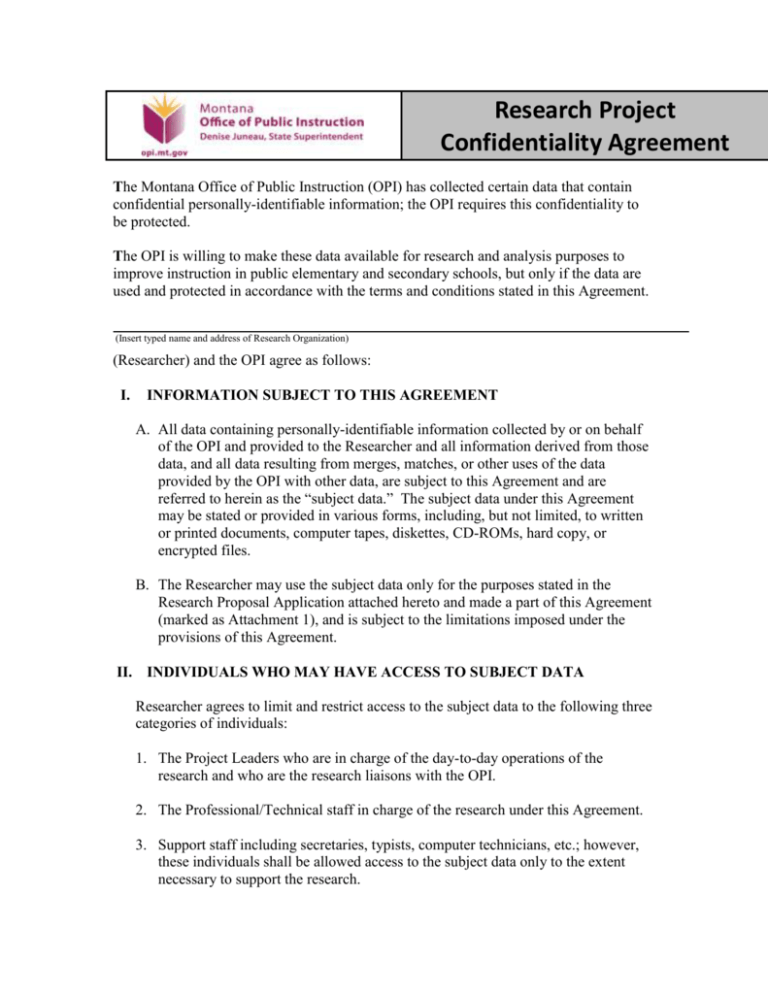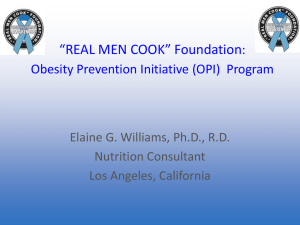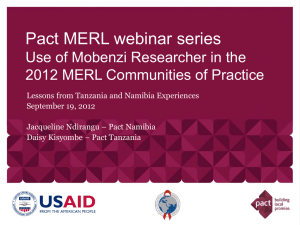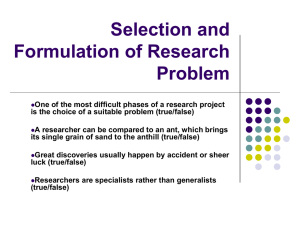Confidentiality Agreement
advertisement

Research Project Confidentiality Agreement The Montana Office of Public Instruction (OPI) has collected certain data that contain confidential personally-identifiable information; the OPI requires this confidentiality to be protected. The OPI is willing to make these data available for research and analysis purposes to improve instruction in public elementary and secondary schools, but only if the data are used and protected in accordance with the terms and conditions stated in this Agreement. (Insert typed name and address of Research Organization) (Researcher) and the OPI agree as follows: I. INFORMATION SUBJECT TO THIS AGREEMENT A. All data containing personally-identifiable information collected by or on behalf of the OPI and provided to the Researcher and all information derived from those data, and all data resulting from merges, matches, or other uses of the data provided by the OPI with other data, are subject to this Agreement and are referred to herein as the “subject data.” The subject data under this Agreement may be stated or provided in various forms, including, but not limited, to written or printed documents, computer tapes, diskettes, CD-ROMs, hard copy, or encrypted files. B. The Researcher may use the subject data only for the purposes stated in the Research Proposal Application attached hereto and made a part of this Agreement (marked as Attachment 1), and is subject to the limitations imposed under the provisions of this Agreement. II. INDIVIDUALS WHO MAY HAVE ACCESS TO SUBJECT DATA Researcher agrees to limit and restrict access to the subject data to the following three categories of individuals: 1. The Project Leaders who are in charge of the day-to-day operations of the research and who are the research liaisons with the OPI. 2. The Professional/Technical staff in charge of the research under this Agreement. 3. Support staff including secretaries, typists, computer technicians, etc.; however, these individuals shall be allowed access to the subject data only to the extent necessary to support the research. III. LIMITATIONS ON DISCLOSURE A. Researcher shall not use or disclose the subject data for any purpose not expressly stated in the Research Proposal Application approved by the OPI unless the Researcher has obtained advance written approval from the OPI. B. Researcher may publish the results, analysis, or other information developed as a result of any research based on the subject data made available under this Agreement only in summary or aggregate form, ensuring the identities of individuals included in the subject data are not revealed. IV. ADMINISTRATIVE REQUIREMENTS A. The research conducted under this Agreement shall be limited to, and consistent with, the purposes stated in the Research Proposal Application. B. Notice and training on confidentiality and nondisclosure. 1. Researcher shall notify and train each of its employees who will have access to the subject data of the strict confidentiality of such data, and shall require each of those employees to execute an Affidavit of Non-Release of Data for Agents of OPI, Other Entities or Researchers. 2. Researcher shall maintain each executed Affidavit of Non-Release of Data for Agents of OPI, Other Entities or Researchers at its facility, and shall allow inspection of the same by the OPI upon request. 3. Researcher shall promptly notify the OPI in writing when the access to the subject data by any individual is terminated, giving the name of the individual and the date of the termination. C. Publications made available to the OPI. 1. Researcher shall provide the OPI a copy of each publication containing information based on the subject data or other data product based on the subject data made available through the OPI. D. Researcher shall notify the OPI immediately in writing upon receipt of any request or demand for disclosure of the subject data. E. Researcher shall notify the OPI immediately in writing upon discovering any breach, or suspected breach, of security, or of any disclosure of subject data to an unauthorized party or agency. V. SECURITY REQUIREMENTS A. Maintenance of, and access to, the subject data. 1. Researcher shall retain the original version of the subject data at a single location and shall not make a copy or extract of the subject data available to anyone except individuals specified in paragraph II. 2. Researcher shall maintain the subject data (whether maintained on a mainframe facility, central server, personal computer, or in print or other medium materials) in an area with access limited to only authorized personnel. Researcher shall not permit removal of any subject data from the limited access area. 3. Researcher shall ensure access to the subject data maintained in computer files or databases is controlled by password protection. Researcher shall maintain all printouts, diskettes, or other physical products containing individuallyidentifiable information derived from subject data in locked cabinets, file drawers, or other secure locations when not in use. 4. Researcher shall ensure all printouts, tabulations, and reports are edited to prevent any possible disclosure of personally-identifiable subject data. 5. Researcher shall establish procedures to ensure the subject data cannot be extracted from a computer file or database by unauthorized individuals. B. Retention of subject data. 1. Researcher shall destroy the subject data, including all copies, when the research that is the subject of this Agreement has been completed or this Agreement terminates, whichever occurs first. VI. TERMINATION OF THIS AGREEMENT 1. This Agreement shall terminate six months from the date it is signed by the OPI. The Agreement, however, may be extended by written agreement of both of the parties. 2. Any violation of the terms and conditions of this Agreement may result in the immediate revocation of this Agreement by the OPI. a. The OPI may initiate revocation of this Agreement by written notice to Researcher indicating the factual basis and grounds of revocation. b. Upon receipt of the written notice of revocation, the Researcher shall immediately cease all research activity related to the Agreement until the issue is resolved. The Researcher will have three business days to submit a written Response to the OPI indicating why this Agreement should not be revoked. c. The OPI Data Privacy and Security Committee shall decide whether to revoke this Agreement based on all the information available to it. The OPI shall provide written notice of its decision to the Researcher within 10 business days after receipt of the Response. These timeframes may extend for good cause. SIGNATURE PAGE By signing below, the individual researcher or official of the Research Organization certifies he or she has the authority to bind the Research Organization to the terms of this Agreement and that the Research Organization has the capability to undertake the commitments in this Agreement. 1. Location at which the subject data will be maintained and analyzed. 2. Signature of the Individual Researcher or Official of the Research Organization 3. Date 4. Type/Print Name of Official 5. E-mail 6. Title 7. Telephone 8. Mailing Address 9. Signature of the Principal Research Analyst 10. Date 11. Type/Print Name of Principal Research Analyst 12. E-mail 13. Title 14. Telephone 15. Mailing Address 16. Signature of OPI Research Liaison 17. Date 18. Type/Print Name of OPI Research Liaison 19. E-mail 20. Title 21. Telephone 22. Mailing Address XXI. EXHIBIT 8 OPI Confidentiality Agreement Confidentiality Agreement As an employee of the Montana Office of Public Instruction (OPI) you may often come in contact with confidential information concerning students and school districts. Employees are required to maintain confidentiality in all areas and may include written or computerized district data, other written material or verbal conversations. The Family Educational Rights and Privacy Act (FERPA) (20 U.S.C. § 1232g; 34 CFR Part 99) is a Federal law that protects the privacy of student education records. The law applies to all schools that receive funds under an applicable program of the U.S. Department of Education. FERPA gives parents certain rights with respect to their children's education records. These rights transfer to the student when he or she reaches the age of 18 or attends a school beyond the high school level. Students to whom the rights have transferred are "eligible students." FERPA information must be kept confidential. The OPI is committed to complying with FERPA and other State and Federal laws protecting our districts' privacy. Violation of the provisions of FERPA can result in civil and criminal penalties for OPI and disciplinary action against the employee, up to and including termination. Guidelines for maintaining confidentiality: 1. Access only those records you need to perform your duties or as authorized by your supervisor. 2. Provide confidential information only to those persons who are authorized to receive it. Your supervisor can give you direction if you are unsure about who has access to the information. 3. Report any suspected breach of confidentiality to your supervisor as you become aware of it. OPI Employees must make reasonable efforts to provide for the security of confidential information. 1. Security of electronic information a. Employees will be granted access to only the level of information that is required by their job duties. b. Each employee must ensure that confidential information on computer screens is not visible to unauthorized persons. This can be accomplished by clearing information from the screen when not actually being used, or minimizing all applications when away from the work space or when approached by an unauthorized person. c. Confidential information will not be e-mailed or faxed. d. When an employee leaves the OPI, the Personnel Office notifies the Information Technology Services Division to immediately terminate the employee's access. Interim access to critical information is the responsibility of the Supervisor. 2. Security of confidential information on paper a. Envelopes marked as containing "confidential information" may only be opened by the recipient or their administrator; b. Confidential information should only be exposed while the employee is working on the document. All other paper forms of confidential information should be covered in file folder or placed face down on the desktop when not in use (such as break or lunch); c. When the employee is away from the desk for an extended period of time (such as being away for two or more hours) all confidential information must be contained in a locked filing cabinet; d. When confidential information is no longer needed, it must be shredded; and 3. Security of confidential information in other media, such as verbal communication. a. Verbal conversations regarding confidential information must only be to authorized personnel and should use as little identifying information as possible. For example, a conversation could identify the student with a number rather than a name. In all cases, the conversation must be limited to the minimum information necessary to accomplish the purpose of the communication; b. Verbal conversations about confidential information should be conducted in a manner and setting that minimizes the amount of the conversation that can be overheard by other individuals; If you have questions concerning this matter, contact your supervisor or Human Resources at 444-3161. My signature indicates that I have read and understand the guidelines regarding confidentiality and I agree to abide by these guidelines. ____________________________________________________ (Printed Name) ___________________________________________________ ______________________________ (Signature) (Date)






